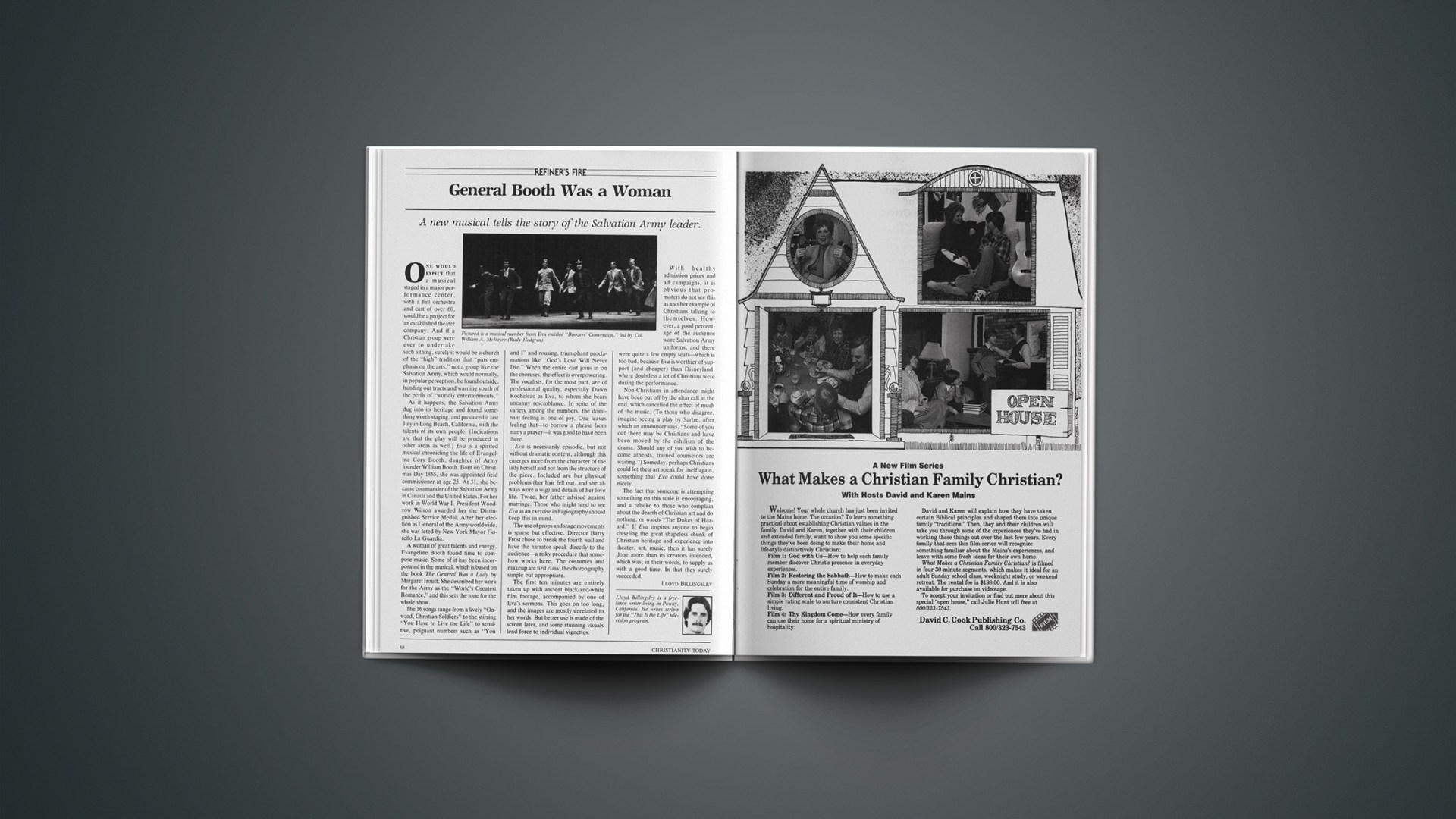A new musical tells the story of the Salvation Army leader.
One would Expect that a musical staged in a major performance center, with a full orchestra and cast of over 60, would be a project for an established theater company. And if a Christian group were ever to undertake such a thing, surely it would be a church of the “high” tradition that “puts emphasis on the arts,” not a group like the Salvation Army, which would normally, in popular perception, be found outside, handing out tracts and warning youth of the perils of “worldly entertainments.”
As it happens, the Salvation Army dug into its heritage and found something worth staging, and produced it last July in Long Beach, California, with the talents of its own people. (Indications are that the play will be produced in other areas as well.) Eva is a spirited musical chronicling the life of Evangeline Cory Booth, daughter of Army founder William Booth. Born on Christmas Day 1855, she was appointed field commissioner at age 23. At 31, she became commander of the Salvation Army in Canada and the United States. For her work in World War I, President Woodrow Wilson awarded her the Distinguished Service Medal. After her election as General of the Army worldwide, she was feted by New York Mayor Fiorello La Guardia.
A woman of great talents and energy, Evangeline Booth found time to compose music. Some of it has been incorporated in the musical, which is based on the book The General Was a Lady by Margaret Iroutt. She described her work for the Army as the “World’s Greatest Romance,” and this sets the tone for the whole show.
The 16 songs range from a lively “Onward, Christian Soldiers” to the stirring “You Have to Live the Life” to sensitive, poignant numbers such as “You and I” and rousing, triumphant proclamations like “God’s Love Will Never Die.” When the entire cast joins in on the choruses, the effect is overpowering. The vocalists, for the most part, are of professional quality, especially Dawn Rocheleau as Eva, to whom she bears uncanny resemblance. In spite of the variety among the numbers, the dominant feeling is one of joy. One leaves feeling that—to borrow a phrase from many a prayer—it was good to have been there.
Eva is necessarily episodic, but not without dramatic content, although this emerges more from the character of the lady herself and not from the structure of the piece. Included are her physical problems (her hair fell out, and she always wore a wig) and details of her love life. Twice, her father advised against marriage. Those who might tend to see Eva as an exercise in hagiography should keep this in mind.
The use of props and stage movements is sparse but effective. Director Barry Frost chose to break the fourth wall and have the narrator speak directly to the audience—a risky procedure that somehow works here. The costumes and makeup are first class; the choreography simple but appropriate.
The first ten minutes are entirely taken up with ancient black-and-white film footage, accompanied by one of Eva’s sermons. This goes on too long, and the images are mostly unrelated to her words. But better use is made of the screen later, and some stunning visuals lend force to individual vignettes.
With healthy admission prices and ad campaigns, it is obvious that promoters do not see this as another example of Christians talking to themselves. However, a good percentage of the audience wore Salvation Army uniforms, and there were quite a few empty seats—which is too bad, because Eva is worthier of support (and cheaper) than Disneyland, where doubtless a lot of Christians were during the performance.
Non-Christians in attendance might have been put off by the altar call at the end, which cancelled the effect of much of the music. (To those who disagree, imagine seeing a play by Sartre, after which an announcer says, “Some of you out there may be Christians and have been moved by the nihilism of the drama. Should any of you wish to become atheists, trained counselors are waiting.”) Someday, perhaps Christians could let their art speak for itself again, something that Eva could have done nicely.
The fact that someone is attempting something on this scale is encouraging, and a rebuke to those who complain about the dearth of Christian art and do nothing, or watch “The Dukes of Hazard.” If Eva inspires anyone to begin chiseling the great shapeless chunk of Christian heritage and experience into theater, art, music, then it has surely done more than its creators intended, which was, in their words, to supply us with a good time. In that they surely succeeded.
Lloyd Billingsley is a free-lance writer living in Poway, California. He writes scripts for the “This Is the Life” television program.










